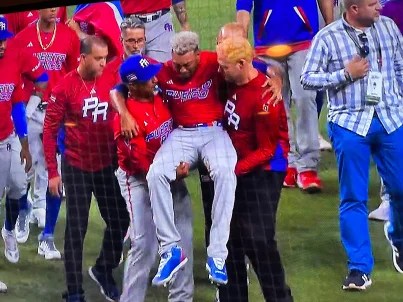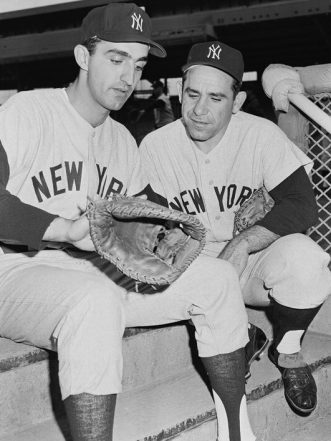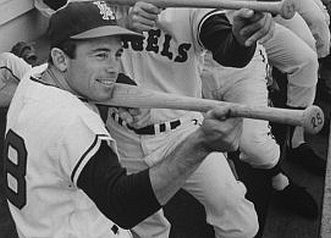
[I]f everybody’s playing baseball the way it should be, don’t ever let that [pitch] clock determine the outcome of the game. Ever.—Max Scherzer.
“I’m not saying the clock’s not valuable,” Scherzer tells The Athletic’s Spink Award Hall of Fame writer Jayson Stark. “It is. But if everybody’s playing baseball the way it should be, don’t ever let that [pitch] clock determine the outcome of the game. Ever.”
Max the Knife was agreeing with Stark’s own assessment, an agreement with which I agree, too, with one codicil I’ll note shortly:
I’d be thinking seriously about turning the clock off in the eighth and ninth innings of games when the score was within three runs either way. That removes the chances of a game ending on a pitch-clock technicality. Plus, when those at-bats freeze in time, as the tension hangs over the big moment, that doesn’t fit anyone’s definition of “dead time.” Does it?
How is it any kind of problem if the game-turning at-bats late in tight games last a few seconds longer? Isn’t that the lesson of Mike Trout versus Shohei Ohtani, as the most dramatic final at-bat any WBC scriptwriter could ever write?
My codicil: Turn the damn pitch clock off for the eight and the ninth, period, I don’t care what the score happens to be. Not even if the game still looks like a blowout with a mushroom cloud. It’s entirely possible for a team to pick up, dust off, and neutralise or overthrow a blowout in the mid or late innings.
You demand the evidence? You got it. Here are the regular season double-digit deficits that started closing up in the fifth or later across Show history:
Twelve-run deficit—5 August 2001: The Guardians (known then as the Indians) down that margin coming into the seventh. Manager Charlie Manuel may or may not have thought it was the impossible deficit when he pulled four regulars out of the lineup. Well, now: Three in the seventh, four in the eighth, five in the ninth—and with two outs, yet—forcing extra innings where a no-name named Jolbert Cabrera sent Kenny Lofton home with a broken-bat single in the eleventh. Final score: 15-14.
15 June 1925: Philadelphia Athletics vs. Cleveland. Down by twelve in the seventh as well, Connie Mack’s men scored once in that inning . . . then sent thirteen runs home in the eighth, an uprising only beginning when Jimmy Dykes slashed a three-run triple. It ended with Hall of Famer Al Simmons hitting a three-run homer. In between, nine of ten reached on seven singles and two walks. Talk about serving the ancient Indians a shit sandwich: they couldn’t push a run across in the top of the ninth. Final: 17-15.
Eleven-run deficit—17 April 1976: Phillies vs. Cubs. The Phillies were in the hole 13-2 by the fifth. Oops. Hall of Famer Mike Schmidt hit a two-run homer in the fifth. They scored three in the seventh, five in the eighth (two-run single by should-be Hall of Famer Dick Allen; three-run bomb by Schmidt), three in the ninth for a 15-13 lead, and—after the Cubs tied it in the bottom of the ninth—a third homer from Schmidt (two runs) and a sacrifice fly, answered by only one Cub run in the bottom of the tenth. 18-6 your final from the Friendly Confines.
Ten-run deficit—As it happens, there are five such games:
2 June 2016, Mariners vs. Padres. The Ms down ten in the top of the sixth; came back to win, 16-13. The biggest inning—the seventh, when the Ms sent nine runs home on seven RBI singles.
8 May 2004, Rangers vs. Tigers. Down 14-4 in the fifth, the Rangers marched back to win, 16-15, in ten innings.
21 August 1990, Phillies vs. Dodgers. Down 11-1 in the eighth, the Phillies overthrew the Dodgers, 12-11. The biggest inning—the Phillies’ nine-run top of the ninth, including John Kruk’s one-out, all-runs-unearned grand slam to tie, followed by a base hit and an RBI double to take the lead the Dodgers couldn’t close in the bottom of the ninth.
4 June 1989, Blue Jays vs. Red Sox. Down 10-0 entering the seventh. The biggest inning—none, really: Two in the seventh on a double play grounder and a ground-rule double. Four in the eighth on a two-run single, an RBI double, and an RBI single. Game-tying RBI single in the ninth. Unanswered two-run homer in the top of the twelfth. 13-11, Jays the final.
25 April 1901, Tigers vs. Orioles. OK, that’s a ringer: in 1901, the Orioles were born as the Milwaukee Brewers, before moving and becoming the infamous St. Louis Browns who moved to Baltimore in 1954. The Tigers trailed 13-3 in the eighth. The game log isn’t available, but the line score is: the Tigers scored one in the eighth and ten in the bottom of the ninth. 14-13 your final, and that was four years before a kid named Ty Cobb arrived in Detroit. By the way, that was also Opening Day, folks.
Berra’s Law: It ain’t over till it’s over. Andujar’s Law: In baseball, there’s just one word—you never know. Stark’s Law: In baseball, anything can happen. Kallman’s Amendment: . . . and usually does. Incumbent or newborn, the rules should not make room for another of Professor Yogi’s fabled observations to come sickeningly true: It gets late early out there.






